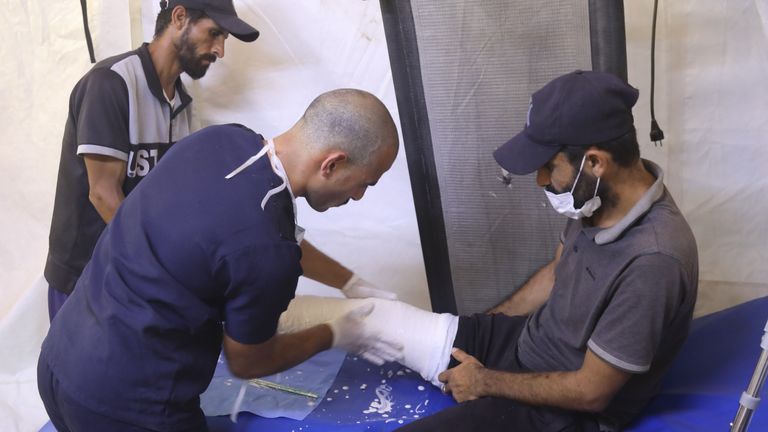A Jordanian-led programme to help fit prosthetic limbs to thousands of victims of the Gaza war has begun.
Two mobile clinics entered Gaza on Monday tasked with helping around 14,000 amputees.
Using cutting-edge British designed technology, the doctors hope to be able to fit a functioning prosthesis every hour.
The estimated cost of each fitting is around £1,000.
“Medical estimates indicate that over 14,000 people have been injured and lost one or more limbs,” said Brigadier General Mustafa al Hiyari, from the Jordanian Armed Forces.
“Our project is distinguished not only by the large number (of prosthetics provided) but also by its speed, as specialists will declare, a prosthetic limb would be installed in less than an hour.
“Those who cannot reach the hospital, the equipped vans will go to them.”
The vast majority of amputees from the war cannot leave Gaza for treatment elsewhere.
The programme involves UK-based companies Koalaa and Amparo, both of which have developed easy-to-fit sockets for upper and lower limb prosthetics.
Each fitting will be registered digitally, allowing for remote follow-up procedures with specialist doctors based in Jordan’s capital Amman or around the world.
‘Beyond catastrophic’ in Gaza
New analysis by aid organisations working in Gaza claims 83% of food aid is being blocked from entering by Israeli authorities.
According to the data, an average of 69 trucks per day entered Gaza during August, compared with 500 a day during the same month in 2023.
During that month, more than one million people didn’t receive any food rations in central or southern Gaza, the research found.
Many in Gaza are now only eating one meal every other day, raising concerns of severe malnutrition and hunger.
“The situation was intolerable long before last October’s escalation and is beyond catastrophic now,” said Jolien Veldwijk, CARE country director in the West Bank and Gaza.
“Over 11 months, we have reached shocking levels of conflict, displacement, disease and hunger.
“Yet, aid is still not getting in, and humanitarian workers are risking their lives to do their jobs while attacks and violations of international law intensify.”
The research also found only 35% of required insulin and half the required blood supply are available in Gaza, while 1.87 million people are in need of shelter.
Israel accuses Hamas of stealing aid and storing it for its own use.
The Israeli government and military also insist aid is entering Gaza but that aid organisations aren’t distributing it effectively.

